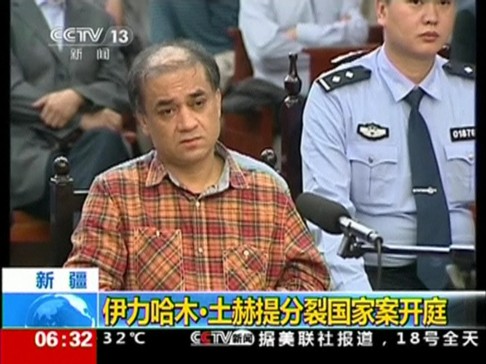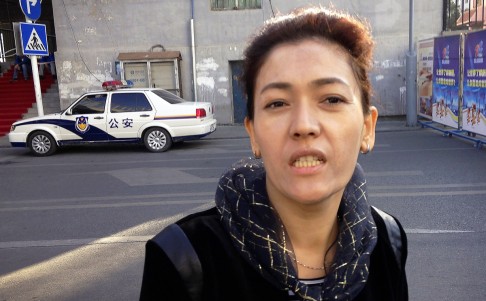
Ilham Tohti to appeal separatism conviction and jailing for life, lawyers say
Scholar highlights plight of seven of his Uygur students also taken away by police in January
Lawyers for Uygur scholar Ilham Tohti formally appealed yesterday against Tohti's conviction and life imprisonment for separatism.
Li Fangping , who represented Tohti, in the two-day trial that ended on Tuesday, told the that he and other lawyers prepared a 15-page appeal overnight and submitted it to the authorities after meeting their client.
"The document strongly condemned all illegal judicial procedures carried out by the police and procuratorial department in Xinjiang . It also requested the authorities acquit him of all charges," Li said.
Tohti, 44, a moderate Uygur scholar who suggested Beijing use peaceful and constructive means and rule of law to ease tension between Han and Ugyurs, was sentenced to life in prison by the Intermediate People's Court of Urumqi for promoting independence for Xinjiang on his Uygur- and Chinese-language website Uighur Online.

He was accused of using the website to attack the central government's policies in the region, according to Xinhua's report of the verdict.
The court claimed Tohti was the leader of an inter-ethnic bloodbath five years ago and Uighur Online had played a role in causing the bloody clashes between Han and Uygurs, Li said.
In the appeal, Tohti said Xinjiang police took him from his Beijing home in January without a warrant, according to Li.
"The authorities [also] simply referred to articles Tohti posted on the website of Uighur Online to support their accusation of separatism," Li said. "They failed to show the court any evidence of how my client took action to direct bloody clashes between Han and Uygurs in the past five years. Not even one witness was presented at the hearing."
Li said that during their meeting Tohti, who was an associate professor in economics at Beijing's Minzu University of China, also expressed serious concerns about the welfare of seven students taken away by Xinjiang police from the university with Tohti.

"Tohti said that compared with his students, he was lucky because at least he had Han lawyers to represent him," Li said. "He said he didn't know the whereabouts of his students and whether the authorities had provided lawyers for them."
Li said that most of the seven Uygur students came from rural families in Xinjiang, and most of their parents could not speak Putonghua.
"It's very difficult for those families to seek legal help from outside if they can't speak Putonghua because all the hearings in Urumqi are in [Putonghua]," Li said.
"Tohti called on the international community to pay attention to the fate of his students and other missing Uygurs."
Li also posted on social network WeChat eight short articles that Tohti wrote in response to the verdict.
In one, he asked relatives who attended the trial to tell his 70-year-old mother that he had received a five-year sentence rather than life.
In a letter to his wife, Guzaili Nuer, he said: "My lover, for the sake of our children, you should be tough. Don't cry [for me]".
Liu Xiaoyuan , who also represented Tohti, said Tohti's wife, his two sons - aged four and seven - and mother had faced immense financial difficulties since the academic's assets were frozen in January.
"Guzaili works as a librarian at Minzu University. She earns just 3,000 yuan a month, which is nowhere near enough to pay the bills," Liu said.
Liu said the authorities' move to freeze all Tohti's bank accounts in January violated national law because "it's groundless to confiscate a suspect's assets before he is formally charged".

